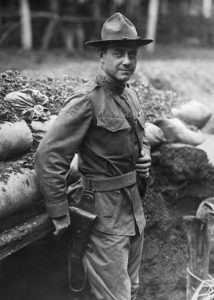
William Hayward
*William Hayward was born on this date in 1877 in Nebraska City, NE. He was a white-American lawyer and military Colonel. He graduated from the University of Nebraska in 1894; Hayward had been a judge in Nebraska for two years when he entered politics in 1903. He served in public office for several years in Nebraska.
In 1911 he moved to New York with his wife, where he was appointed Assistant District Attorney in New York County and then New York State Public Service Commissioner. Hayward was instrumental in organizing, recruiting, and training the 369th regiment. He used his political connections to support the regiment and agreed to recruit Black company-level officers. He wrote in a letter in 1919: “I’ve always told these boys I’d never send them anywhere I would not go myself, so I went first to the trenches, prowled around, saw it all, and came back to the regiment to take in the battalion which was to go in first.”
In command, he organized and commanded the first Black U.S. Army's 369th Infantry Regiment, known as the "Harlem Hellfighters.” Deployed to actions in France, the 369th spent 191 days in front-line trenches, more than any other American unit, and suffered the most losses of any American regiment, with 1,500 casualties. Under Colonel Hayward’s command and despite severe losses, the 369th turned in a good account in heavy fighting, capturing important villages, advancing faster than French troops, and becoming the first Allied unit to reach the Rhine River. The 369th, for its service, was presented with the French Croix de Guerre for gallantry, plus American decorations to include numerous Distinguished Services Crosses and two Medal of Honor awards.
In December 1917, when Colonel Hayward and the 369th Infantry Regiment returned to the U.S., they had not been permitted to participate in the farewell parade of New York's National Guard, the so-called Rainbow division. Hayward was given because "black is not a color in the Rainbow." Hayward pulled every political string he could to assure his men would be rewarded with a victory parade when they came home in February 1919.
Colonel Hayward and the 369th Infantry Regiment received a hero’s welcome on that day. They were the first unit to march up Fifth Avenue from the Washington Square Park Arch to their armory in Harlem; Hayward led the parade, and their unit was placed on the permanent list with other veteran units. Crowds thronged New York City's Fifth Avenue as they marched to the music of their now-famous regimental jazz band leader, James Reese Europe.
After the war, President Harding appointed Hayward U.S. Attorney for the Southern District of New York, serving until 1925. After leaving office, he practiced law and served as the new American Professional Football League general counsel. Colonel William Hayward died in Manhattan, NY on October 13, 1944. He is buried at Cedar Grove Cemetery in New London, CT.